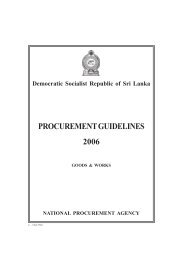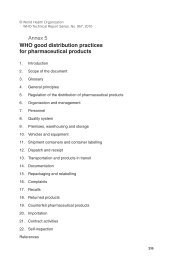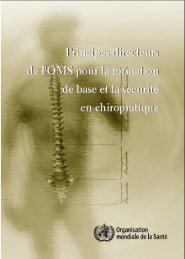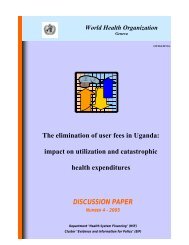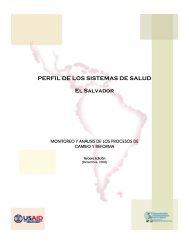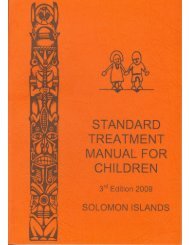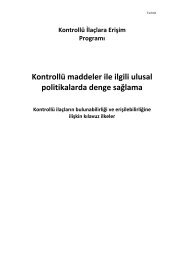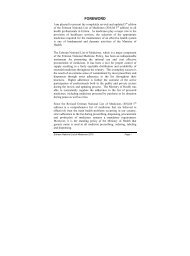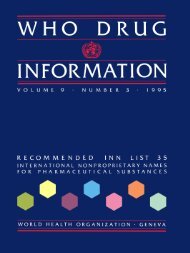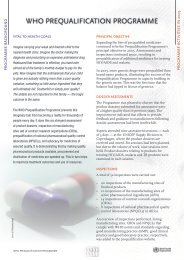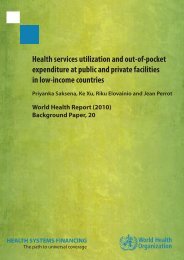Safety and Efficacy Issues<strong>WHO</strong> <strong>Drug</strong> <strong>Information</strong> <strong>Vol</strong>. <strong>24</strong>, <strong>No</strong>. 4, <strong>2010</strong>tions for the treatment of prostate cancer.This action is based on the Agency’sreview of several published studies (1–7),described in the Agency’s ongoing safetyreview of GnRH agonists and possibleincreased risk of diabetes and certaincardiovascular diseases, issued in May<strong>2010</strong>.GnRH agonists are approved for palliativetreatment of advanced prostate cancer.The benefits of GnRH agonist use forearlier stages of non-metastatic prostatecancer have not been established.References1. Keating NL, O’Malley JO, Smith MR.Diabetes and cardiovascular disease duringandrogen deprivation therapy for prostatecancer. J Clin Oncol. 2006;<strong>24</strong>:4448–4456.2. Keating NL, O’Malley JO, Freedland SJ,Smith MR. Diabetes and cardiovasculardisease during androgen deprivation therapy:observational study of Veterans with prostatecancer. J Natl Cancer Inst. <strong>2010</strong>;102:39–46.3. Tsai HK, D’Amico AV, Sadetsky N, Chen M-H, Carroll PR. Androgen deprivation therapyfor localized prostate cancer and the risk ofcardiovascular mortality. J Natl Cancer Inst.2007;99:1516–15<strong>24</strong>.4. Saigal CS, Gore JL, Krupski TL, Hanley J,Schonlau M, Litwin MS, and the UrologicDiseases in America project. Androgendeprivation therapy increases cardiovascularmorbidity in men with prostate cancer. Cancer.2007;110:493–500.5. Van Hemelrijck M, Garmo H, Holmberg L,Ingelsson E, Bratt O, Bill-Axelson A, et al.Absolute and relative risk of cardiovasculardisease in men with prostate cancer: resultsfrom the population-based PCBaSe Sweden.J Clin Oncol. <strong>2010</strong>;28:3448–56.6. Alibhai SMH, Duong-Hua M, Sutradhar R,Fleshner NE, Warde P, Cheung AM, et al.Impact of androgen deprivation therapy oncardiovascular disease and diabetes. J ClinOncol. 2009;27:3452–3458.7. Efstathiou JA, Bae K, Shipley WU, HanksGE, Pilepich MV, Sandler HM, Smith MR.Cardiovascular mortality after androgendeprivation therapy for locally advancedprostate cancer: RTOG 85-31. J Clin Oncol.2008;27:92–99.8. FDA <strong>Drug</strong> Safety Communication, 20October <strong>2010</strong> at http://www/fda.govGadolinium-based contrastagents: kidney dysfunctionUnited States of America — The Foodand <strong>Drug</strong> Administration (FDA) is requiringchanges to the drug labelling forgadolinium-based contrast agents(GBCAs) to minimize the risk of nephrogenicsystemic fibrosis (NSF), a rare butserious condition associated with the useof GBCAs in certain patients with kidneydysfunction.These label changes are intended to helpensure these drugs are used appropriately,and that patients at risk for NSFwho receive GBCAs are actively monitoredfor the development of NSF. Symptomsof NSF include scaling, hardeningand tightening of the skin, red or darkpatches on the skin, and stiffness. NSFcan also cause fibrosis of internal organswhich may lead to death. There is noeffective treatment for NSF.Reference: FDA <strong>Drug</strong> Safety Communication,9 September <strong>2010</strong> at http://www/fda.govLamotrigine: asepticmeningitisUnited States of America — The Foodand <strong>Drug</strong> Administration (FDA) hasinformed the public that lamotrigine(Lamictal®), a medication commonlyused for seizures in children two yearsand older and bipolar disorder in adults,can cause aseptic meningitis. FDA isrevising the drug label and the patientmedication guide to include informationabout this risk.302
<strong>WHO</strong> <strong>Drug</strong> <strong>Information</strong> <strong>Vol</strong>. <strong>24</strong>, <strong>No</strong>. 4, <strong>2010</strong>Safety and Efficacy IssuesThe decision to revise the Lamictal® labelis based on FDA’s identification of 40cases of aseptic meningitis in patientsfrom December 1994 to <strong>No</strong>vember 2009.Reference: FDA <strong>Drug</strong> Safety Communication,12 August <strong>2010</strong> at http://www/fda.govTinzaparin sodium: renalImpairment in elderlyCanada — The manufacturer of tinzaparinsodium (Innohep®) has informedhealthcare professionals of importantsafety information related to results froma clinical study that was stopped prematurely(IRIS – Innohep® in Renal InsufficiencyStudy) due to the observance ofincreased mortality. This study involvedthe use of therapeutic doses of tinzaparinsodium for the treatment of acute venousthromboembolism (VTE) in elderly patientswith renal impairment.Tinzaparin sodium is a low molecularweight heparin. It is authorized for theprevention of postoperative VTE inpatients undergoing orthopaedic surgeryand in patients undergoing generalsurgery who are at high risk of developingpostoperative VTE; the treatment of deepvein thrombosis (DVT) and/or pulmonaryembolism (PE); and the prevention ofclotting in indwelling intravenous lines forhaemodialysis and extracorporeal circulationin patients without high bleeding risk.Based on the observations in IRIS:• The study was halted by the Data SafetyMonitoring Committee due to an interimfinding of an increase in all-causemortality in patients who receivedtinzaparin sodium compared tounfractionated heparin (UFH).• Tinzaparin sodium is not recommendedin elderly patients over 70 years of agewith renal impairment.• Tinzaparin sodium should be used withcaution in patients with moderate tosevere renal impairment and in allcases of impaired renal function patientsshould be closely monitored.The IRIS study was an international,multicentre, prospective, open, centrallyrandomized, parallel group study comparingtreatment doses of tinzaparin sodiumand UFH for the initial treatment of DVTand/or PE in elderly patients with renalimpairment.Reference: Communication from LEOPharma Inc., dated 14 October <strong>2010</strong> at http://www.hc-sc.gc.ca/Tamoxifen: drug interactionsinvolving CYP2D6 geneticvariantsUnited Kingdom — CYP2D6 geneticpolymorphisms and concomitant use ofpotent CYP2D6 inhibitors may be associatedwith variability in clinical response inpatients treated with tamoxifen for breastcancer. Therefore, concomitant use ofmedicines known to be potent CYP2D6inhibitors should be avoided wheneverpossible in patients treated withtamoxifen. Current data for the effect ofgenetic polymorphisms are insufficient tosupport recommending genotyping ofpatients.Tamoxifen is a selective oestrogenreceptormodulator indicated for palliativeand adjuvant treatment of oestrogenreceptor-positivebreast cancer in premenopausaland postmenopausalwomen. Tamoxifen is a prodrug, and theformation of the active metabolite,endoxifen, is mediated by the CYP2D6enzyme. Several articles have recentlybeen published regarding the potentialeffect of CYP2D6 genetic variants onclinical response to tamoxifen treatmentin patients with breast cancer.In patients with inherited non-functionalalleles of the CYP2D6 gene (“poormetabolisers”) or in patients concomi-303
- Page 1 and 2: WHO Drug Information Vol. 24, No. 4
- Page 3 and 4: WHO Drug Information Vol. 24, No. 4
- Page 5 and 6: WHO Drug Information Vol. 24, No. 4
- Page 7 and 8: WHO Drug Information Vol. 24, No. 4
- Page 9 and 10: WHO Drug Information Vol. 24, No. 4
- Page 11: WHO Drug Information Vol. 24, No. 4
- Page 15 and 16: WHO Drug Information Vol. 24, No. 4
- Page 17 and 18: WHO Drug Information Vol. 24, No. 4
- Page 19 and 20: WHO Drug Information Vol. 24, No. 4
- Page 21 and 22: WHO Drug Information Vol. 24, No. 4
- Page 23 and 24: WHO Drug Information Vol. 24, No. 4
- Page 25 and 26: WHO Drug Information Vol. 24, No. 4
- Page 27 and 28: WHO Drug Information Vol. 24, No. 4
- Page 29 and 30: WHO Drug Information Vol. 24, No. 4
- Page 31 and 32: WHO Drug Information Vol. 24, No. 4
- Page 33 and 34: WHO Drug Information Vol. 24, No. 4
- Page 35 and 36: WHO Drug Information Vol. 24, No. 4
- Page 37 and 38: WHO Drug Information Vol. 24, No. 4
- Page 39 and 40: WHO Drug Information Vol. 24, No. 4
- Page 41 and 42: WHO Drug Information Vol. 24, No. 4
- Page 43 and 44: WHO Drug Information Vol. 24, No. 4
- Page 45 and 46: WHO Drug Information Vol. 24, No. 4
- Page 47 and 48: WHO Drug Information Vol. 24, No. 4
- Page 49 and 50: WHO Drug Information Vol. 24, No. 4
- Page 51 and 52: WHO Drug Information Vol. 24, No. 4
- Page 53 and 54: WHO Drug Information Vol. 24, No. 4
- Page 55 and 56: WHO Drug Information Vol. 24, No. 4
- Page 57 and 58: WHO Drug Information Vol. 24, No. 4
- Page 59 and 60: WHO Drug Information Vol. 24, No. 4
- Page 61 and 62: WHO Drug Information, Vol. 24, No.
- Page 63 and 64:
WHO Drug Information, Vol. 24, No.
- Page 65 and 66:
WHO Drug Information, Vol. 24, No.
- Page 67 and 68:
WHO Drug Information, Vol. 24, No.
- Page 69 and 70:
WHO Drug Information, Vol. 24, No.
- Page 71 and 72:
WHO Drug Information, Vol. 24, No.
- Page 73 and 74:
WHO Drug Information, Vol. 24, No.
- Page 75 and 76:
WHO Drug Information, Vol. 24, No.
- Page 77 and 78:
WHO Drug Information, Vol. 24, No.
- Page 79 and 80:
WHO Drug Information, Vol. 24, No.
- Page 81 and 82:
WHO Drug Information, Vol. 24, No.
- Page 83 and 84:
WHO Drug Information, Vol. 24, No.
- Page 85 and 86:
WHO Drug Information, Vol. 24, No.
- Page 87 and 88:
WHO Drug Information, Vol. 24, No.
- Page 89 and 90:
WHO Drug Information, Vol. 24, No.
- Page 91 and 92:
WHO Drug Information, Vol. 24, No.
- Page 93 and 94:
WHO Drug Information, Vol. 24, No.
- Page 95 and 96:
WHO Drug Information, Vol. 24, No.
- Page 97 and 98:
WHO Drug Information, Vol. 24, No.
- Page 99 and 100:
WHO Drug Information, Vol. 24, No.
- Page 101 and 102:
WHO Drug Information, Vol. 24, No.
- Page 103 and 104:
WHO Drug Information, Vol. 24, No.
- Page 105 and 106:
WHO Drug Information, Vol. 24, No.
- Page 107 and 108:
WHO Drug Information, Vol. 24, No.
- Page 109 and 110:
WHO Drug Information, Vol. 24, No.
- Page 111 and 112:
WHO Drug Information, Vol. 24, No.
- Page 113 and 114:
WHO Drug Information, Vol. 24, No.
- Page 115 and 116:
WHO Drug Information, Vol. 24, No.
- Page 117 and 118:
WHO Drug Information, Vol. 24, No.
- Page 119 and 120:
WHO Drug Information, Vol. 24, No.
- Page 121 and 122:
WHO Drug Information, Vol. 24, No.
- Page 123 and 124:
WHO Drug Information, Vol. 24, No.
- Page 125 and 126:
WHO Drug Information, Vol. 24, No.
- Page 127 and 128:
WHO Drug Information, Vol. 24, No.



